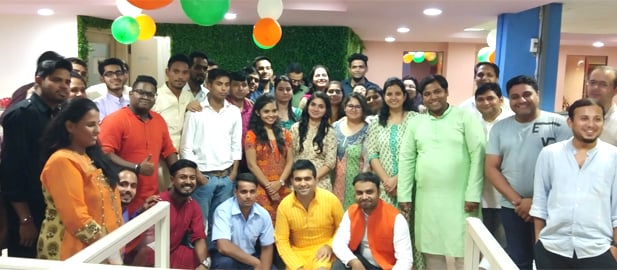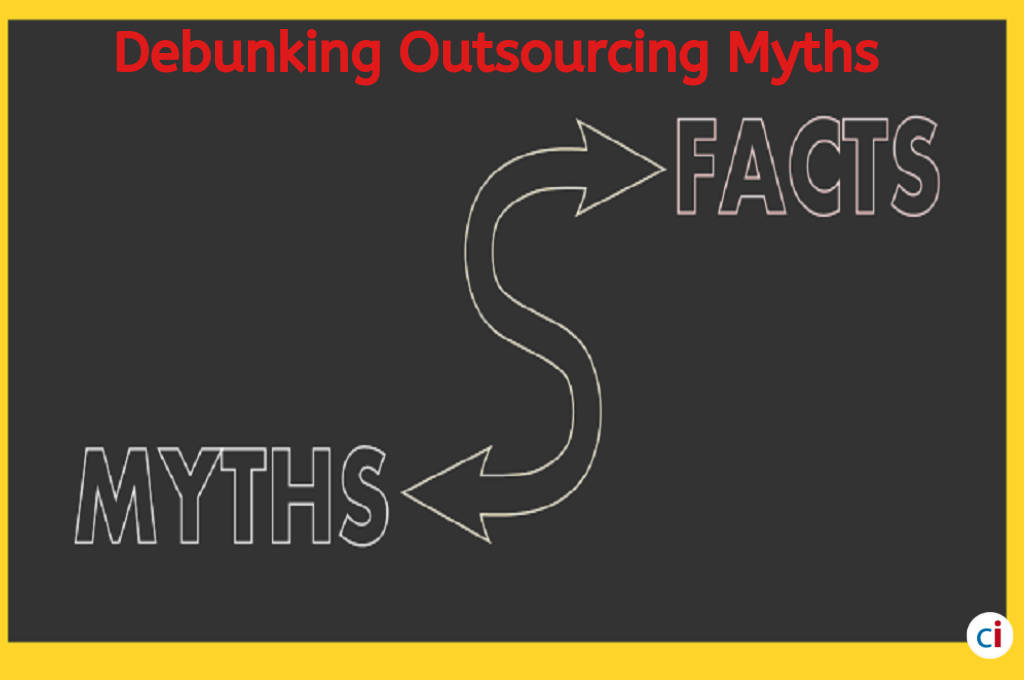If you are planning to outsource and are confused about how much the bill would come, this Outsourcing Costs Guide is for you. It is a complete guide that will explain everything that you might want to know about the cost of outsourcing. You can now also Download Outsourcing Costs Guide and read it on the go!
Outsourcing is a widely used business practice. The IT industry is one of the major players in the outsourcing business. But, still many businesses are confused whether to outsource their IT projects or not. For example, many businesses are unable to decide whether they should build an app by hiring in-house team of developers or should they outsource it.
One of the reasons for this confusion lies in the myths prevailing about outsourcing. In this blog, we will try to debunk common myths about outsourcing so that you can get a clear picture of it.
Myth 1: When You Outsource, You Lose Control Over Your Project
This is a common myth that prevents businesses from outsourcing their projects. Companies fear that outsourcing to a third-party will result in losing control over the project.
In reality, this is not the case. Outsourcing service providers fully involve the businesses to the extent they want. They keep them fully updated on the progress of the project and provide them comprehensive reports. Communication and collaboration tools help businesses to interact in real-time with the staff of the outsourcing services providers and exercise full control over the project.
Myth 2: Outsourcing Results In A Low-Quality Product
It is often thought that outsourcing product development, for example, mobile app development, results in a low-quality product in comparison to in-house product development. The main reason behind this thought is that outsourcing to India and other developing countries comes with a low price tag and low price is associated with poor quality.
But the truth is that a low-quality product is not the result of outsourcing, but of poor skills of the developers whether in-house or of the outsourcing service provider. When product development is outsourced to an outsourcing company that has expert and experienced developers, the developed product is always of high quality.
The rates of software and web development in India and other Asian countries are lower because of the differences in the economies of these countries in comparison to the US. It has nothing to do with poor quality. Outsourcing to India is preferred by the US companies mainly because of the timely delivery of high quality products. By following the best coding practices, agile methodology and thorough quality testing, outsourcing services providers are able to create robust products.

Myth 3: Outsourcing Comes With Language and Cultural barriers
Businesses that want to outsource their projects to offshore destinations, often worry about the language and cultural differences.
Difficulties in language and culture get resolved, if a business outsources its project to a country where people understand and speak English comfortably, and have a good experience in working with the companies of English-speaking countries. For example, software development outsourcing services providers in India are well-versed in the English language and have a lot of experience in working with the US, UK and Australian businesses. In fact, India is set to become a technology leader by 2030 and more companies will plan to hire remote developers from India or outsource their projects here.
Myth 4: Time-Zone Difference Poses A Problem
Businesses think that outsourcing to a company in a country having huge time difference can lead to problems in collaboration.
Actually, time-zone differences can be utilized to advantage. For example, when people in the US stop working, people in India start their shifts. This allows for a continuous 24 hours productivity cycle and results in faster delivery of projects.
Collaboration problem can be resolved by making use of overlapping hours when the teams of both the business that has outsourced its project and the outsourcing service provider are present to collaborate through the internet. These overlapping hours are the beginning hours of the shift for the US team and the ending hours of the shift for the Indian team.
Another way to overcome the problem posed by the time-difference is by working in the night-shift. This means that the team in India works during the night while the US team works in its regular day-shift.
Myth 5: Outsourcing Compromises Data Security
Issues with company’s privacy and risk of data breach are important concerns for businesses that turn them away from outsourcing.
Outsourcing service providers do their best for ensuring full security of their clients’ data. If they will not do this, they will lose the trust of their clients and will damage their reputation in the market.
Besides putting in practice stringent security measures, the outsourcing service providers follow the standard regulations such as HIPAA (Health Insurance Portability and Accountability Act) for developing a health app and General Data Protection Regulation (GDPR) for processing the data of the EU citizens.
Myth 6: Employees of Outsourcing Service Providers Are Not Adequately Skilled
There is a misconception that the employees of the outsourcing services providers are inadequately skilled.
In reality, an outsourcing services provider hires highly talented and skilled employees from a pool of huge talent present in its country. For example, India has a large number of talented and skilled IT professionals. The outsourcing services providers in India can easily choose expert and experienced professionals from this pool.
Myth 7: Outsourcing Service Provider May Steal Intellectual Property Rights
It is a common fear that when you outsource software development to a third-party, it may steal the code, disclose it to an external party, or may not provide you the full IP rights.
In reality, an outsourcing service provider signs legally binding documents such as a non-disclosure agreement (NDA) with a business that prevents disclosure of the project to any external party and confers exclusive product rights to the business. Thus, businesses don’t have to worry about getting the full ownership of the product.
Myth 8: Outsourcing Takes More Time Than In-House Development
Businesses often think that getting the project done by its own employees is much faster than the time taken by an outsourcing service provider to accomplish the project.
Outsourcing service providers are experts in their fields. For example, a mobile app development outsourcing company has a staff of expert and experienced developers that easily understand the requirements of the clients, and develop and deliver high-quality products quickly.
If a business has to develop a mobile app in-house, it has to first of all spend time and money in hiring skilled developers, and after that the process of development will begin. So, the total amount of time spent will be more than that taken by an outsourcing service provider.
Myth 9: It Is Not Possible To Use Agile And DevOps With Outsourcing
Some businesses think that agile methodology and DevOps cannot be utilized with outsourcing.
The fact is that the most successful outsourcing services providers make use of agile methodology, DevOps, best coding practices and stringent quality control in order to deliver products of the highest quality.
Outsourcing has been the key to success for many companies. But the myths surrounding it have barred some businesses from adopting it. It is hoped that the above discussion has debunked these outsourcing myths in order to allow businesses to use outsourcing and derive maximum benefits from it.
Originally Published On 10th July 2019; Updated On 12th September 2019






















